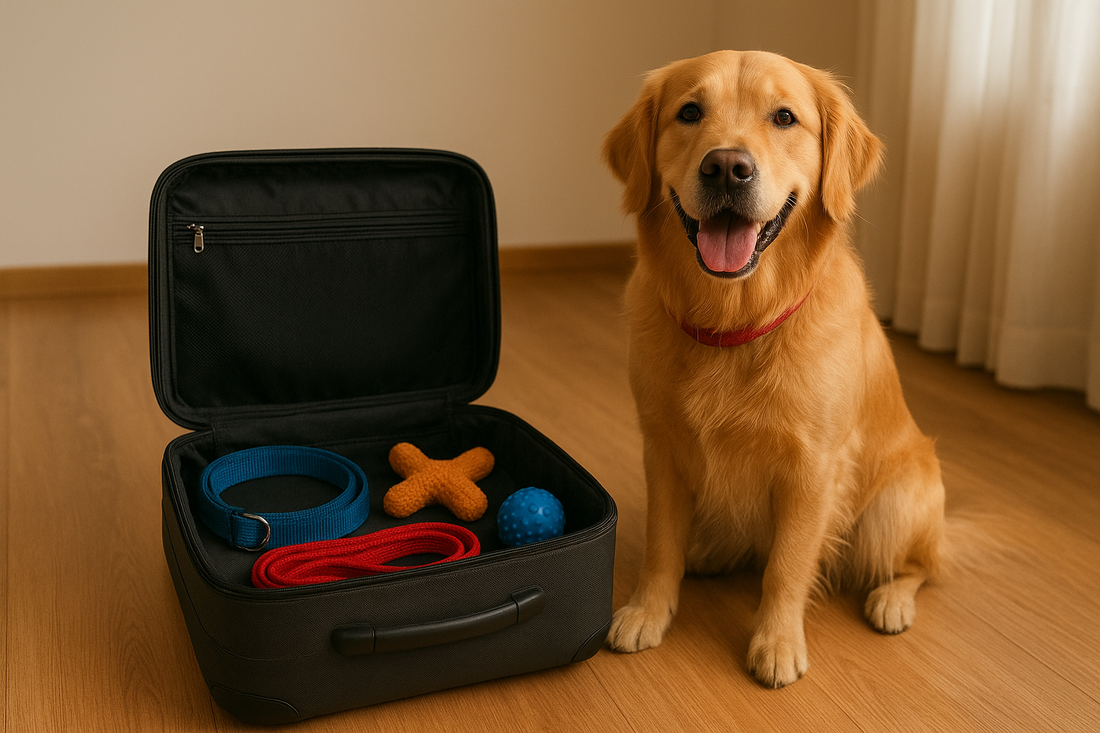
TRAVELLING WITH DOGS: Tips for Stress-Free Trips
Traveling with your dog can be one of the most rewarding experiences for any pet parent. Whether you’re heading on a weekend getaway, a cross-country road trip, or even flying abroad, bringing your furry companion along turns every journey into an adventure. However, traveling with dogs also requires preparation, patience, and a little planning to ensure both you and your pup have a smooth and stress-free trip.
This comprehensive guide will cover everything you need to know — from packing essentials and transportation tips to hotel stays and safety measures — so you and your dog can hit the road with confidence.
1. Preparing Your Dog for Travel
 Before you set off, it’s important to make sure your dog is ready — physically and emotionally — for the journey ahead.
Before you set off, it’s important to make sure your dog is ready — physically and emotionally — for the journey ahead.
a. Schedule a Vet Check-Up
A quick visit to the vet ensures your dog is healthy enough to travel. Ask your veterinarian about:
- Vaccinations: Make sure all are up to date.
- Travel documents: Some destinations require health certificates or proof of vaccinations.
- Flea and tick prevention: Especially important if you’re traveling to rural or wooded areas.
- Motion sickness: If your dog gets carsick, your vet can recommend medications or natural remedies.
Pro Tip: Bring copies (and digital photos) of your vaccination records, just in case hotels or airlines request proof.
b. Practice Short Trips
If your dog isn’t used to long rides, start with short car trips. Gradually increase the duration to help them adjust. This simple step can make a huge difference in reducing anxiety and motion sickness.
c. Identification Is Key
Your dog should wear a collar with ID tags that include your contact information, such as your phone number. It’s also a good idea to:
- Microchip your pet (and update your contact info).
- Attach a travel tag with your destination address or temporary phone number.
2. Packing the Dog Travel Essentials
 Think of your dog’s suitcase just like your own. Having the right items on hand can make travel comfortable and safe.
Think of your dog’s suitcase just like your own. Having the right items on hand can make travel comfortable and safe.
Must-Have Dog Travel Essentials
- Leash and harness: Always bring a backup leash.
- Collapsible food and water bowls
- Dog food and treats: Pack enough for the entire trip, plus a few extra days.
- Bottled water: Prevents upset stomachs from unfamiliar water.
- Poop bags: Never leave a trace behind.
- Comfort items: A favorite blanket, toy, or bed can help your dog feel at home.
- First-aid kit: Include tweezers, antiseptic wipes, gauze, and your vet’s contact info.
- Towels: For muddy paws or unexpected rain.
- Medications: Keep them in labeled containers with clear instructions.
Pro Tip: Store everything in a designated “dog travel bag” so you’re not digging through your luggage every time you need something.
3. Traveling by Car with Your Dog
 Road trips are often the easiest and most enjoyable way to travel with dogs. But keeping your dog safe in the car is a must.
Road trips are often the easiest and most enjoyable way to travel with dogs. But keeping your dog safe in the car is a must.
a. Use a Safety Harness or Crate
Never let your dog ride unrestrained in the car. It’s unsafe for both of you. Use:
- A crash-tested dog seat belt or harness
- A well-ventilated travel crate secured with a seatbelt or anchor
Avoid letting your dog stick their head out the window — flying debris can cause injury.
b. Keep the Car Comfortable
- Maintain a cool temperature with air conditioning or window shades.
- Make sure there’s good ventilation.
- Never, ever leave your dog alone in a parked car — even for a few minutes. Temperatures can rise dangerously fast.
c. Plan for Frequent Breaks
Stop every 2–3 hours to let your dog stretch, drink water, and go potty. Choose safe rest areas or pet-friendly parks along your route.
Pro Tip: Research dog-friendly rest stops in advance. Some even have fenced play areas!
d. Avoid Car Sickness
If your dog tends to get carsick:
- Feed a light meal 3–4 hours before travel.
- Keep the car well-ventilated.
- Offer water, but avoid overhydration.
- Try natural remedies like ginger (ask your vet first).
4. Flying with Your Dog
 Air travel can be stressful for pets, so careful planning is crucial.
Air travel can be stressful for pets, so careful planning is crucial.
a. Check Airline Pet Policies
Each airline has different rules for pet travel. Before booking, confirm:
- Size and weight limits for in-cabin pets
- Approved carrier dimensions
- Required documentation (like health certificates)
- Breed restrictions (some airlines don’t allow short-nosed breeds in cargo)
If your dog is small enough, it’s best to keep them in the cabin with you.
b. Choose the Right Pet Carrier
Your carrier should:
- Be airline-approved
- Have adequate ventilation
- Allow your dog to stand, turn around, and lie down comfortably
- Have a leak-proof bottom
Line the carrier with an absorbent pad and a soft blanket.
c. Prepare for Security Screening
At airport security, you’ll need to remove your dog from the carrier and carry them through the checkpoint while the carrier goes through the X-ray machine. Keep your leash on and hold them securely.
Pro Tip: Arrive early to allow extra time for check-in and security procedures.
d. Cargo Travel Considerations
If your dog must travel in cargo:
- Fly nonstop whenever possible.
- Avoid extreme temperatures (morning or evening flights are safest in summer).
- Label the crate clearly with your name, phone number, and destination.
- Attach a “Live Animal” sticker and a photo of your dog for easy identification.
5. Staying in Pet-Friendly Accommodations
 Finding the right place to stay can make your trip far smoother. Thankfully, more hotels, Airbnbs, and vacation rentals welcome pets than ever before.
Finding the right place to stay can make your trip far smoother. Thankfully, more hotels, Airbnbs, and vacation rentals welcome pets than ever before.
a. Book Pet-Friendly Lodging
When booking:
- Confirm weight and breed restrictions
- Ask about pet fees or deposits
- Check for nearby walking areas or parks
Hotels like Kimpton, La Quinta and more are known for being dog-friendly.
b. Create a Comfortable Space
Once you arrive:
- Set up your dog’s bed, toys, and food/water area
- Keep routines consistent — same feeding and walking times
- Don’t leave your dog alone in the room unless allowed and your pet is calm
Pro Tip: Bring a travel mat or blanket that smells like home to reduce anxiety in new environments.
6. International Travel with Dogs
 If you’re crossing borders, there are extra steps to consider.
If you’re crossing borders, there are extra steps to consider.
a. Research Entry Requirements
Each country has specific rules for importing pets. Common requirements include:
- Rabies vaccination certificate
- Microchip identification
- Health certificate from an accredited vet
- Possible quarantine period
Start researching at least two months before travel.
b. Get Pet Travel Documents
Your vet can issue an official health certificate (often called a Certificate of Veterinary Inspection). Check if your destination requires a USDA endorsement for international travel.
c. Prepare for Customs
Some countries inspect pets upon arrival. Keep documents handy and remain calm — your dog will pick up on your energy.
Pro Tip: Check the U.S. Department of Agriculture’s APHIS Pet Travel website for up-to-date information before booking.
7. Keeping Your Dog Calm and Comfortable
 Traveling can be overwhelming for dogs, especially in unfamiliar environments. A calm mindset makes a world of difference.
Traveling can be overwhelming for dogs, especially in unfamiliar environments. A calm mindset makes a world of difference.
a. Exercise Before Travel
A tired dog is a happy traveler. Go for a long walk or play session before hitting the road or heading to the airport.
b. Use Calming Aids
Consider:
- Calming chews or pheromone sprays
- Anxiety vests (like ThunderShirts)
- Soothing music or white noise
Pro Tip: Create a “travel playlist” of soft sounds to help relax your pup during long drives or flights.
c. Stay Calm Yourself
Dogs are incredibly perceptive. If you’re stressed, they will be too. Keep your tone light and reassuring.
8. Exploring Your Destination
 Once you arrive, it’s time to enjoy your trip! With a little awareness, you can ensure your dog stays safe and happy while exploring new places.
Once you arrive, it’s time to enjoy your trip! With a little awareness, you can ensure your dog stays safe and happy while exploring new places.
a. Stick to a Routine
Keep consistent meal times, walk times, and rest periods. Familiar routines help dogs feel secure.
b. Research Local Dog Rules
Every city or country has its own pet laws. Check for:
- Leash requirements
- Dog park locations
- Pet-friendly beaches or trails
Always clean up after your pet — it’s the best way to keep destinations welcoming for future travelers.
c. Watch for Local Hazards
New environments may expose your dog to unfamiliar dangers:
- Hot pavement or sand
- Toxic plants
- Unfamiliar wildlife or insects
Inspect areas before letting your dog roam freely.
9. Returning Home
 When you return, your dog might need a little time to readjust to familiar surroundings.
When you return, your dog might need a little time to readjust to familiar surroundings.
a. Unpack Their Items First
Set up your dog’s bed and food area right away. Familiar scents can ease the transition.
b. Monitor for Stress or Illness
Travel can cause minor stomach upset or fatigue. If your dog seems off for more than a couple of days, check in with your vet.
Pro Tip: Keep an eye out for ticks or fleas after outdoor adventures.
10. Bonus: Fun Dog Travel Ideas
 Looking for inspiration? Here are a few dog-friendly travel ideas that make for unforgettable experiences:
Looking for inspiration? Here are a few dog-friendly travel ideas that make for unforgettable experiences:
- National Parks (like Acadia or Shenandoah)
- Beach vacations with off-leash areas
- Camping trips (dogs love hiking and campfires)
- Pet-friendly road trips through scenic routes like California’s Highway 1
- Dog festivals or pet expos in major cities
Final Thoughts
Traveling with your dog doesn’t have to be stressful - with the right preparation, it can be an amazing bonding experience. Whether you’re exploring new trails, relaxing on the beach, or visiting family, your dog will love being by your side.
Remember: patience, preparation, and a positive attitude go a long way. Every trip together strengthens your connection and builds unforgettable memories.
So pack your bags, grab the leash, and get ready for an adventure your furry friend will never forget.
Tags: dog travel tips, traveling with dogs, pet-friendly vacations, road trips with dogs, air travel with pets, dog safety travel, dog travel checklist, traveling with dogs, dog travel tips, road trips with dogs, air travel with pets, dog travel checklist, stress-free dog travel, travel safety for dogs, how to travel with your dog
